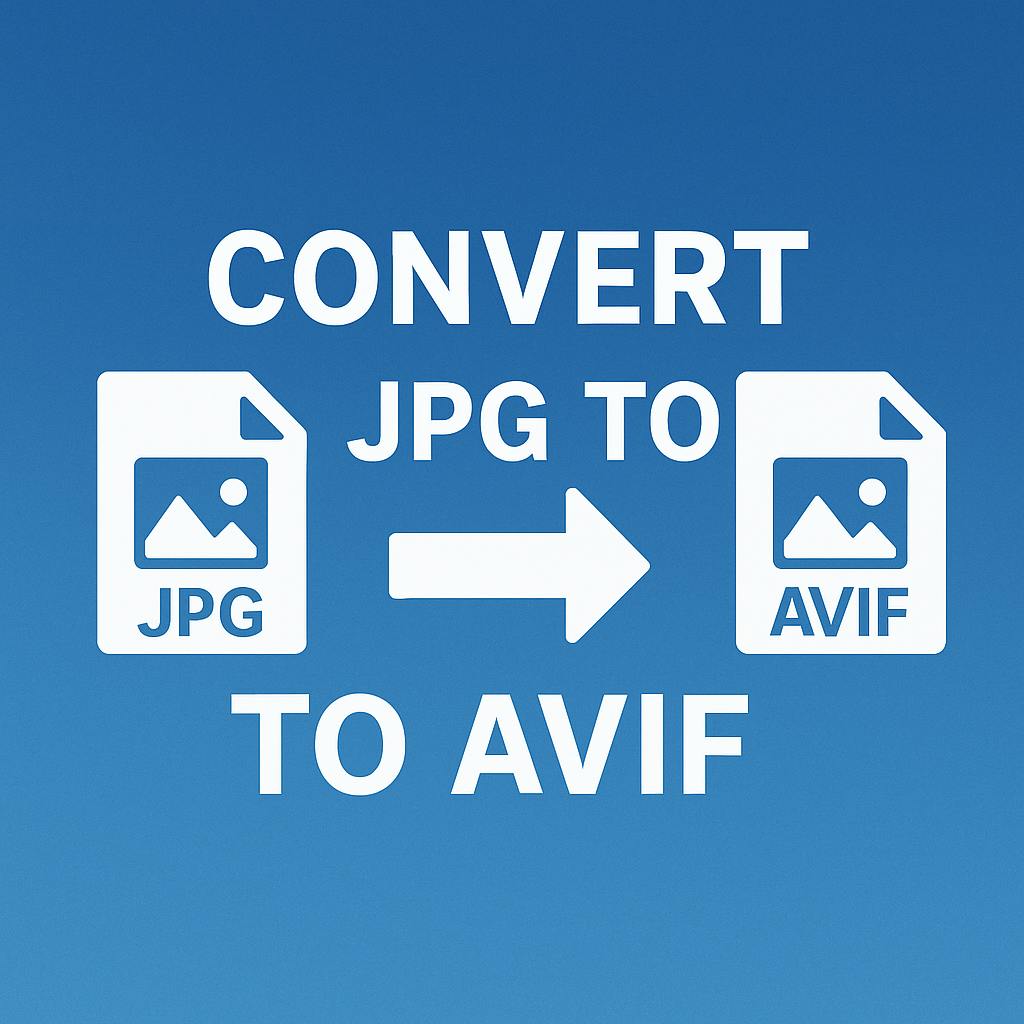Mass Convert Images to AVIF — Subfolders Included!
April 4, 2025

🔄 How to Convert All Your Images (Even in Subfolders!) to AVIF on Windows Using ImageMagick 🖼️🚀
🧠 Why Convert to AVIF?
If you're building a website or app, optimizing images is key to performance. That’s where AVIF comes in — it offers:
- 🔥 Super high compression (smaller file sizes than WebP or JPG)
- 🖼️ Excellent image quality
- ⚡️ Faster load times for your users
But how do you convert all your .jpg, .png, .webp files — including those buried in subfolders — into .avif in one go?
Let’s do it like pros 💻
🛠️ Step 1: Install ImageMagick
First, download and install ImageMagick, the powerful image conversion tool.
- Go to imagemagick.org
- Download the Windows version with legacy utilities and DLL support
- During installation:
- ✅ Enable "Add application directory to your system path"
- ✅ Install WebP and AVIF support if prompted
After it installs, check it's working:
magick -version
If you see AVIF and WEBP in the output — you’re golden 🍀
📁 Step 2: Organize Your Image Folder
Let’s say your images are in this structure:
C:\Users\You\Pictures\my-images
├── image1.jpg
├── subfolder
│ └── image2.png
└── deeper\more
└── image3.webp
Create an empty output folder:
C:\Users\You\Pictures\converted-avif
💡 Step 3: The Magic Batch Script
Create a .bat file that automates the whole thing — and even recreates your folder structure!
1. Open Notepad and paste this:
@echo off
setlocal enabledelayedexpansion
set "INPUT_DIR=C:\Users\You\Pictures\my-images"
set "OUTPUT_DIR=C:\Users\You\Pictures\converted-avif"
set /a count=0
set "LOG_FILE=%OUTPUT_DIR%\conversion-log.txt"
echo Converting images to AVIF > "%LOG_FILE%"
echo Started at: %DATE% %TIME% >> "%LOG_FILE%"
echo. >> "%LOG_FILE%"
for /r "%INPUT_DIR%" %%F in (*.jpg *.jpeg *.png *.webp) do (
set "FILE=%%~F"
set "EXT=%%~xF"
set "NAME=%%~nF"
set "REL_PATH=%%~dpF"
set "REL_PATH=!REL_PATH:%INPUT_DIR%=!"
if not exist "%OUTPUT_DIR%!REL_PATH!" (
mkdir "%OUTPUT_DIR%!REL_PATH!"
)
magick "%%~F" "%OUTPUT_DIR%!REL_PATH!!NAME!.avif"
echo Converted: %%~F >> "%LOG_FILE%"
echo Converted: %%~F
set /a count+=1
)
echo. >> "%LOG_FILE%"
echo Finished at: %DATE% %TIME% >> "%LOG_FILE%"
echo Total images converted: !count! >> "%LOG_FILE%"
echo.
echo ✅ Done! Total images converted: !count!
echo 📄 Log saved to: %LOG_FILE%
pause
OR
To delete the original image after conversion, but only if the input and output directories are the same, you can add a conditional check inside your loop. Here's how you can adjust your .bat file:
✅ Updated .bat file (with conditional deletion):
@echo off
setlocal enabledelayedexpansion
set "INPUT_DIR=C:\Users\User\Desktop\flickstudios.co.in\flick-studios-frontend\public"
set "OUTPUT_DIR=C:\Users\User\Desktop\flickstudios.co.in\flick-studios-frontend\public"
set /a count=0
set "LOG_FILE=%OUTPUT_DIR%\conversion-log.txt"
echo Converting images to AVIF > "%LOG_FILE%"
echo Started at: %DATE% %TIME% >> "%LOG_FILE%"
echo. >> "%LOG_FILE%"
for /r "%INPUT_DIR%" %%F in (*.jpg *.jpeg *.png *.webp) do (
set "FILE=%%~F"
set "EXT=%%~xF"
set "NAME=%%~nF"
set "REL_PATH=%%~dpF"
set "REL_PATH=!REL_PATH:%INPUT_DIR%=!"
if not exist "%OUTPUT_DIR%!REL_PATH!" (
mkdir "%OUTPUT_DIR%!REL_PATH!"
)
magick "%%~F" "%OUTPUT_DIR%!REL_PATH!!NAME!.avif"
if exist "%OUTPUT_DIR%!REL_PATH!!NAME!.avif" (
echo Converted: %%~F >> "%LOG_FILE%"
echo Converted: %%~F
set /a count+=1
rem Delete original only if input and output folders are same
if /i "%INPUT_DIR%"=="%OUTPUT_DIR%" (
del "%%~F"
echo Deleted original: %%~F >> "%LOG_FILE%"
)
) else (
echo ❌ Failed to convert: %%~F >> "%LOG_FILE%"
)
)
echo. >> "%LOG_FILE%"
echo Finished at: %DATE% %TIME% >> "%LOG_FILE%"
echo Total images converted: !count! >> "%LOG_FILE%"
echo.
echo ✅ Done! Total images converted: !count!
echo 📄 Log saved to: %LOG_FILE%
pause
🔍 Key additions:
- if /i "%INPUT_DIR%"=="%OUTPUT_DIR%" (: This checks if input and output directories are the same (case-insensitive).
- del "%%~F": Deletes the original image file after successful conversion.
- Logs are updated to reflect deletion status and failures.
2. Save it as:
convert-to-avif.bat
🚀 Step 4: Run It Like a Boss
- ✅ Double-click the .bat file
- ⏳ Watch the console show each image being converted
- 📄 When done, check the log file in your output folder to see:
- Which images were converted
- When it started and ended
- How many total
📂 Bonus: Preserves Folder Structure
Yup, this script doesn’t just dump files in one place — it keeps your original folder layout. So if you had:
my-images\sub1\img1.jpg
You'll get:
converted-avif\sub1\img1.avif
🎛 Optional: Control Compression
Want to reduce file size more? Add the -quality flag like this:
magick "%%~F" -quality 60 "%OUTPUT_DIR%!REL_PATH!!NAME!.avif"
Adjust quality (0 = smallest, 100 = best).
📣 That’s a Wrap!
Now you’ve got lightning-fast .avif images and a fully automated conversion flow — even for deep folder structures. All thanks to the power of ImageMagick and a little batch scripting magic 💫
💬 Got Questions?
Drop them in mail!